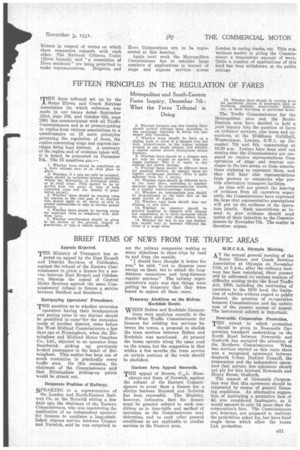FIFTEEN PRINCIPLES IN THE REGULATION OF FARES
Page 117

If you've noticed an error in this article please click here to report it so we can fix it.
Metropolitan and South-Eastern Fares Inquiry, December 7th : What the Fares Tribunal is Doing
MEE fares tribunal set up by the
Motor Hirers and Coach Services Association (to which reference • was made in our issues dated September 22nd, page 184, and October 6th, page 250) ha e communicated with all Traffic Commissioners and is at present getting in replies from various associations to a questionnaire on 15 main principles governing the regulation of fares, the replies concerning stage and express Carriages being kept distinct. A summary of the replies and of evidence taken will, it is hoped, be presented on December 7th. The 15 questions are:— a.. Whether fares should be considered on a basic mileage rate, or as from Place to place. 2.Whether, if a rate per mile be accepted, there should be variations between operation within the Metropolis, in provincial towns, or in rural areas. (This matter to be regarded from the point of view of both operating costs and the density of population served.)
3. 'Whether there should be varying rates for seasons in the year and, if so, whether this should apply to all towns or only to graded destinations or only to certain named PESCatld.
4. Whether there should be varying scales for week-end fares as compared with midweek fares.
5. Whether consideration shoed be given to the nature of the ground, density of population, or type of vehicle operated. 6. Whether between any two termini there should prevail different fares, according to the partic4ar direction in which the pas senger Jirst•travelled. " •
7. Whether fares should be fixed on a sliding scale to allow of a cheaper rate per mile, proportionate to the higher mileage covered in any single journey, and whether a similar system should incorporate return (ourneys.
8. Whether there should be a cheaper rate per mile for returns as against that for single journeys. This is to apply 1.0 day returns and period returns.
9. Whether there should be different fares for seasonal services, as against those for regular all-the-year services. (This is quite different from -No. 1 above.)
10. Whether there should be different fares to the same place, according to whether operated under an excursion-and-tour licence. or a regular express-carriage licence. , 11. Whether an intermediate fare should be proportionate to the total fare on the same service or higher.
12. Whether road fares should bear any ralation to rail fares.
13, Whether an operator should be granted facilities to compete with intense rail competition as in those instances where the railways grant very cheap return fares.
14. Whether the fare to any one destination should vary 88 between different disWets of a large town. 15. Whether there should be varying fares for particular classes of passenger, such as workmen, children, season-ticket holders, etc., or those travelling at particular hours.
The Traffic Commissioners for the 3.1etropolitan area and the SouthEastern area have decided to hold a joint inquiry into the question of fares on ordinary services, also tours and excursions, at the Middlesex Guildhall, Westminster, London, .S.W.1, on December 7th and 8th, commencing at 10.30 a.m. Letters have been sent out stating that the Commissioners are prepared to receive representations from operators of stage and express carriages in the two areas, or from associations claiming to represent them, and they will hear also representations from persons or companies who provide alternative transport facilities.
As time will not permit the hearing of evidence from all operators separately, the Commissioners have expressed the hope that ropresentative associations will put up the evidence of the operators jointly. Such associations as intend to give evidence should send notice of their intention to the Commissioners by November 7th. The matter is therefore urgent.








































































































































































































































